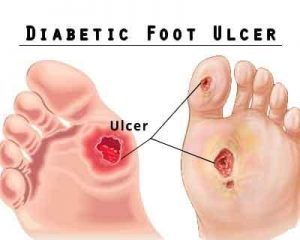- Home
- Editorial
- News
- Practice Guidelines
- Anesthesiology Guidelines
- Cancer Guidelines
- Cardiac Sciences Guidelines
- Critical Care Guidelines
- Dentistry Guidelines
- Dermatology Guidelines
- Diabetes and Endo Guidelines
- Diagnostics Guidelines
- ENT Guidelines
- Featured Practice Guidelines
- Gastroenterology Guidelines
- Geriatrics Guidelines
- Medicine Guidelines
- Nephrology Guidelines
- Neurosciences Guidelines
- Obs and Gynae Guidelines
- Ophthalmology Guidelines
- Orthopaedics Guidelines
- Paediatrics Guidelines
- Psychiatry Guidelines
- Pulmonology Guidelines
- Radiology Guidelines
- Surgery Guidelines
- Urology Guidelines
Healing of diabetic foot ulcer delayed in patients of obstructive sleep apnea

There is a high prevalence of features and risk of obstructive sleep apnea in people with diabetic foot ulcers. A STOP-BANG score ≥4 predicts poor diabetic foot ulcer healing. Obstructive sleep apnea may be a potential, modifiable risk factor/treatment target to improve diabetic foot ulcer outcomes. These are the results from a study published in the Diabetic Medicine.
G. Maltese, Department of Diabetes and Endocrinology, and colleagues conducted the study to assess the prevalence of risk factors for obstructive sleep apnoea in people with diabetic foot ulcers and to determine whether this risk predicts diabetic foot ulcer healing.
The researchers studied 94 consecutive people (69% men) with diabetic foot ulcers (Type 2 diabetes, n=66, Type 1 diabetes, n=28) attending a university hospital foot unit. All participants were screened for obstructive sleep apnea using the STOP-BANG questionnaire, with a score ≥4 identifying high risk of obstructive sleep apnea. The primary outcome was poor diabetic foot ulcer healing, defined as diabetic foot ulcer recurrence (diabetic foot ulcers which healed and re-ulcerated in same anatomical position) and diabetic foot ulcer persistence (no evidence of healing on clinical examination). All participants were evaluated at 12 months.
Read Also: No Association Between HbA1c and Wound Outcomes of diabetic foot ulcers
Key Findings:
- Of the 94 participants, 60 (64%) had a STOP-BANG score ≥4.
- Over 12 months, 27 participants with a score ≥4 had poor diabetic foot ulcer healing as compared to seven with a score <4 (45% vs 20.5%; P=0.025).
- A STOP-BANG score ≥4 significantly increased the relative risk of poor healing more than twofold, independently of other risk factors in multivariate analyses.
"There is a high prevalence of features and risk of obstructive sleep apnea in people with diabetic foot ulcers. A STOP-BANG score ≥4 predicts poor diabetic foot ulcer healing. Obstructive sleep apnea may be a potential, modifiable risk factor/treatment target to improve diabetic foot ulcer outcomes," concluded the authors.
For more information log on to https://doi.org/10.1111/dme.13780

Disclaimer: This site is primarily intended for healthcare professionals. Any content/information on this website does not replace the advice of medical and/or health professionals and should not be construed as medical/diagnostic advice/endorsement or prescription. Use of this site is subject to our terms of use, privacy policy, advertisement policy. © 2020 Minerva Medical Treatment Pvt Ltd